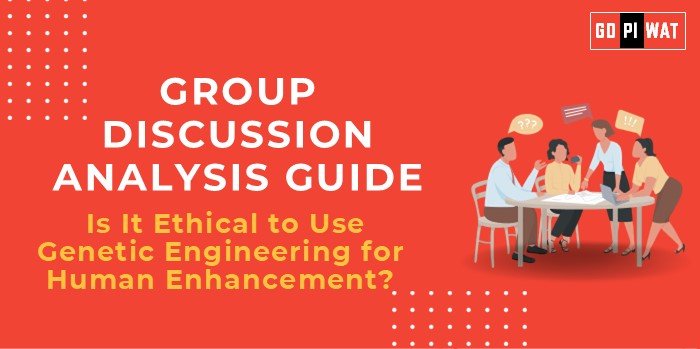📋 Group Discussion (GD) Analysis Guide: Is It Ethical to Use Genetic Engineering for Human Enhancement?
🌐 Introduction to the Topic
Opening Context: Genetic engineering, particularly for human enhancement, is no longer a distant concept but a reality shaping scientific, ethical, and societal debates globally. From CRISPR advancements to personalized medicine, the potential to alter human capabilities raises profound ethical dilemmas.
Topic Background: While genetic engineering has its roots in combating diseases, its application for enhancing intelligence, physical ability, or lifespan sparks concerns about equity, identity, and the essence of humanity.
📊 Quick Facts and Key Statistics
- 🧬 CRISPR Success Rate: Precision gene-editing technology CRISPR has a 98% accuracy rate in targeting specific DNA sequences, revolutionizing genetic interventions.
- 💰 Global Investment: Over $5 billion invested in human genome editing research (2023).
- ⚕️ Diseases Targeted: Genetic editing trials focus on over 50 hereditary diseases.
- 🚫 Ethical Approval Gap: Only 15% of countries allow germline editing under strict regulations.
🤝 Stakeholders and Their Roles
- 🏛️ Governments: Regulate genetic engineering practices to ensure ethical compliance.
- 🔬 Scientific Community: Conducts research and establishes technical boundaries.
- ⚖️ Ethics Committees: Evaluate the moral implications of human enhancement.
- 🏢 Private Sector: Invests in genetic editing technologies, driving innovation and commercialization.
- 👥 Society: Faces potential impacts on equality and socio-cultural norms.
🏆 Achievements and Challenges
✨ Achievements
- ⚕️ Medical Breakthroughs: Eradication of inherited disorders like sickle cell anemia in early trials.
- ⏳ Increased Lifespan Potential: Genetic alterations to delay aging processes.
- 🔬 Technological Advancements: CRISPR’s rapid adoption in labs worldwide.
- 📈 Economic Boost: Biotech innovation fosters economic growth in developed nations.
⚠️ Challenges
- ⚖️ Ethical Concerns: “Designer babies” could exacerbate inequality.
- 🧪 Unintended Consequences: Potential off-target genetic effects with long-term risks.
- 🌍 Global Divide: Wealthier nations may dominate access and applications.
🌍 Global Comparisons
- Germany: Strong regulations prohibit germline editing for enhancements.
- USA: Permits limited research; focused on somatic gene therapy.
📚 Case Study
China’s CRISPR Experiment: Experiment on twin babies drew widespread criticism for ethical violations.
UK’s HFEA: Allows gene editing for disease prevention, not enhancement.
📄 Structured Arguments for Discussion
- ✅ Supporting Stance: “Genetic engineering enhances human potential, reducing genetic diseases and improving quality of life.”
- ❌ Opposing Stance: “It undermines ethical boundaries, risks societal inequality, and commodifies human life.”
- ⚖️ Balanced Perspective: “While genetic engineering offers medical benefits, its enhancement use must align with ethical and societal frameworks.”
🎯 Effective Discussion Approaches
- Opening Approaches:
- ⚖️ “Is it ethical to alter humanity’s biological blueprint for the sake of improvement?”
- 📊 “With $5 billion invested, genetic engineering’s rapid growth demands ethical scrutiny.”
- Counter-Argument Handling:
- ✅ Acknowledge the benefits but highlight alternative ethical solutions like equitable access.
- 🔄 Use analogies, e.g., medical advancements being inaccessible initially but later universal.
📊 Strategic Analysis of Strengths and Weaknesses
- 💪 Strengths: Eliminates genetic diseases, advances human capabilities.
- 📉 Weaknesses: Ethical and moral concerns, high costs and exclusivity.
- 🚀 Opportunities: Policy-driven equitable access, interdisciplinary collaboration in science and ethics.
- ⚡ Threats: Misuse for non-medical enhancements, cultural resistance and legal battles.
📈 Connecting with B-School Applications
- 🌐 Real-World Applications: Ethical frameworks for biotech startups, innovation management, and healthcare leadership.
- 🗣️ Sample Interview Questions:
- 💬 “How should ethical concerns shape the commercialization of genetic engineering?”
- ⚖️ “Can genetic engineering widen societal inequalities?”
- 🎓 Insights for Students:
- Research opportunities in ethics and biotechnology.
- Policy-making roles in regulatory bodies.


